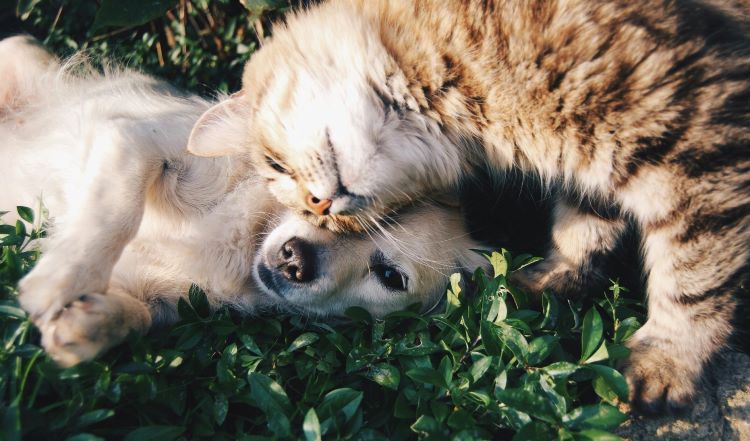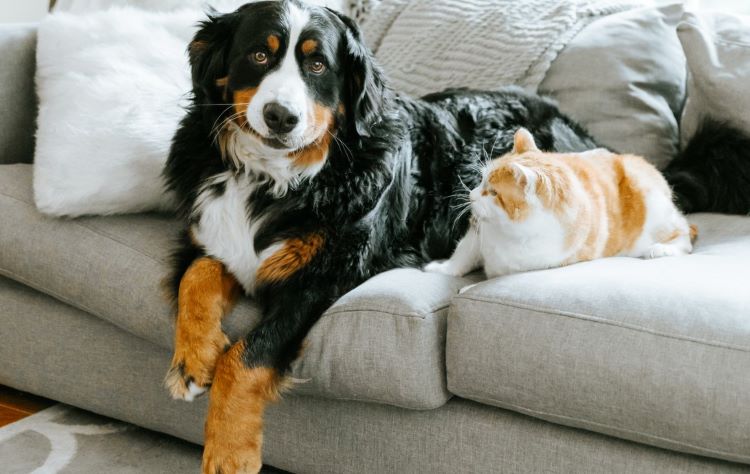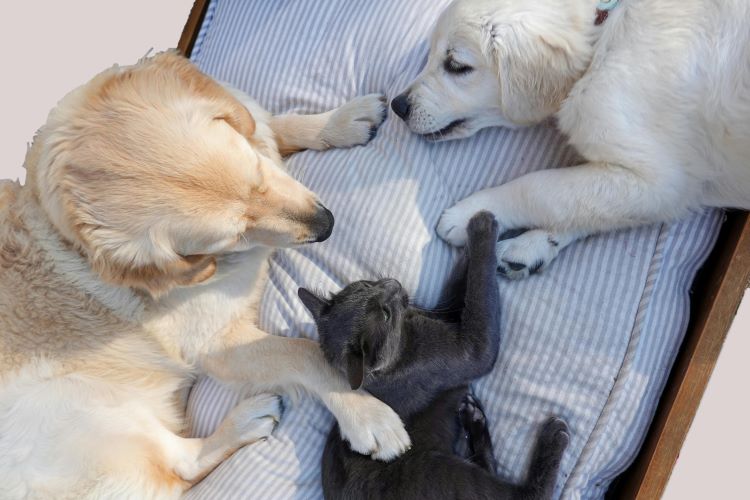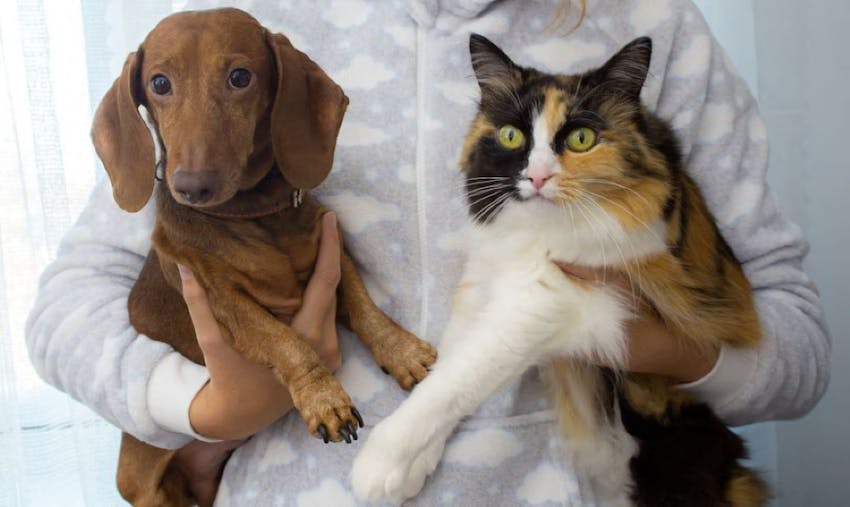Ready to help treat your pet to a healthy life?
Dog Breeds that are Good with Cats
By : Nikki Edwards | Published May 28, 2024

Bringing a new dog into a household with a resident cat can be a delicate process. While successful integration largely depends on the individual personalities of the pets involved, certain dog breeds have traits that make them more likely to get along well with cats (and other pets). Thinking of introducing a canine friend to your feline family? Use this handy guide to explore a variety of dog breeds known for their compatibility with feline companions.
Does breed matter in dog-cat relationships?
All dogs are different, so there's no guarantee your dog will or won't get along with your cat due to breed alone. However, dogs who have been bred to hunt or point are more likely to see cats as something to chase or hunt, so you may want to avoid these types of breeds if possible. However, socialization and temperament are also very important, so if a dog within those breed categories has already cohabitated with cats or has an unusual temperament, it may not be a deal breaker.
Likewise, you can increase your chances of successful canine-feline bonding by going with a breed known to be more open to felines. While you're at it, you may also want to take a look at the friendliest cat breeds.
13 Dog breeds that can get along well with cats
From gentle giants to playful pals, these breeds have earned reputations as excellent playmates and tolerant siblings for cats in the same household.
1. Basset Hound
This breed is known for its laid-back and easygoing nature, which is naturally helpful with skittish cats. The dogs’ low energy levels make them less likely to chase or insist on playing if your cat is not so inclined. Basset Hounds also tend to respect space and boundaries, which is important for successful integration with cats. Though bred for hunting, Basset Hounds tend to be calm and non-aggressive on their own.
2. Beagle
Beagles are friendly dogs that typically enjoy the company of both humans and other pets. With proper socialization, Beagles can develop great friendships with cats and can learn to live harmoniously, especially when raised together from a young age. Beagles have historically been used as hunting dogs, however, so it is important to establish appropriate behavior early on in your household. Introducing Beagles to cats while they are still puppies (and smaller than the cat) is a good idea. That said, it's worth noting that they typically only display hunting / aggressive behavior when in packs, so solo Beagles are likely to do just fine with cats.
3. Bernese Mountain Dog
These large, fluffy dogs tend to be friendly and confident, which can be a perfect match for an assertive cat. Initially, your cat may be wary of a Bernese Mountain Dog due to their larger size, so cautious introductions are key. However, they do not have a strong prey drive, so it’s certainly easier to train them to live with cats than other big dog breeds.

4. Bichon Frise
The Bichon Frise is known for their cheerful disposition and love for social interaction. Their friendly nature and gentle temperament allow them to bond with cat siblings, enjoying companionship and cuddle sessions together (cat permitting!).
5. Bulldog
The lazy nature of this stout breed make them great housemates for cats. A smaller type of Mastiff, the Bulldog is known for its sweet, affectionate, and non-aggressive nature — a great match for the nervous cat who isn’t sold on the idea of a new sibling.
6. Cavalier King Charles Spaniel
Despite their overwhelmingly regal name, Cavalier King Charles Spaniels are non-fussy pups who can adapt to a variety of environments and situations. Accordingly, they typically get along well with cats when properly introduced. With their gentle temperament, Cavaliers often form strong bonds with their feline friends, enjoying companionship and playtime together.
7. Golden Retriever
Known for their friendly and gentle personality, Golden Retrievers are often a great match for cats. With proper socialization, Golden Retrievers can live very well together with cats, enjoying their company without exhibiting predatory behavior.
8. Labrador Retriever
Labs are the quintessential pet, full of love to give and great around humans and other pets. They are known for being very trainable and are often able to understand the boundaries often set by their kitty companions.

9. Maltese
Maltese dogs are gentle and affectionate and often get along well with cats. Their small size and non-threatening demeanor put cats at ease, fostering positive relationships between the two. And with their playful and outgoing nature, Maltese enjoy engaging in interactive play with their feline housemates.
10. Miniature Poodle
Mini poodles are intelligent and adaptable dogs that generally cohabitate well with cats. Their non-aggressive nature makes them quite suitable companions. Training and socialization will create the best opportunity for mini poodles to reside with their cat siblings.
11. Newfoundland
Newfies are sweet and full of fluff and would love nothing more than to be the center of attention, getting all the pets and scratches. Their patient and calm demeanor pairs purr-fectly with the personality quirks of cats.
12. Pekingese
With the charming and borderline-royal appearance of the Pekingese, you'd think they would be picky with cats — but that's not usually the case with this dog breed. They’re known to be both loyal and independent, while also extremely laid-back — which complements living with the more reserved cat counterparts very nicely.
13. Pug
Pugs are undoubtedly full of love, and cats can make for their perfect, unlikely friend that matches their size. Pugs are usually calm and easy to please, but able to stand their ground firmly against their bossy cat friends. Being such social dog breeds, pugs can get along well with most any pets.

Introducing dogs and cats safely
Careful planning should be a priority prior to introducing a dog and a cat for the first time. It's important both pets are considered before deciding to put the two in the same home together, as they can both be picky in their own ways. Calmer dogs are generally more well-received by cats, and the dog needs to also be able to tolerate a cat running around.
Tips for encouraging bonding
Successfully integrating a new dog into a household with a resident cat requires patience, understanding, and careful consideration of each animal's needs. It’s also important to understand how pets socialize and interact with each other and that it is often different in how they interact with humans.
According to a recent behavioral study on dogs and cats, “The dog often looks for physical contact with the cat while the cat's approach is less interactive. However, cohabitation and familiarity allow the cat to form interspecific social bonds. Many dogs and cats living in the same household sleep and play together and few owners reported mutual aggressive interactions. Moreover, though the two species have different body languages, dogs and cats understand each other and respond accordingly.”
If you encounter persistent issues or aggression between the dog and cat, don't hesitate to seek guidance from a professional animal behaviorist. They can provide tailored advice and strategies to help your pets live together peacefully, and Trupanion pet insurance coverage may be able to cover a qualified animal behavioral specialist.
By choosing a dog breed known for its compatibility with cats and following these tips for introduction and integration, you can create a harmonious environment where dogs and cats can thrive together as lifelong companions.
